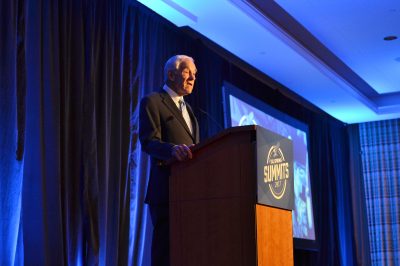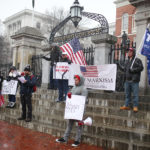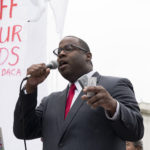
Former Texas congressman and presidential candidate Ron Paul addressed approximately 500 members of the Young Americans for Liberty on Saturday at YAL’s first Boston spring summit.
Speaking at the Seaport World Trade Center, Paul discussed problems that libertarians face today. He said that he believes liberty can usher in a peaceful era.
“If we just had this change in attitude, that we reject the use of force in anything that we do on a personal level and hold the feet to the fire of anybody in Washington or anybody in government … then I believe we would enter into an age of peace and prosperity, which should be our goal,” Paul said.
Besides just adopting these ideals, Paul emphasized the importance of spreading the message of liberty to others.
“If the lightbulb goes on and you understand this is true, liberty is the answer … you’re in a very rare group of people,” Paul said. “But if you have that … then you have an obligation, I believe, to spread that message.”
The daylong conference also featured a speech, various workshops and networking opportunities for the hundreds of YAL members in attendance. YAL focuses on promoting liberty on college campuses, with more than 900 chapters across the United States, YAL President Cliff Maloney said.
“We really aim to educate through campus activism and bring people to the idea that individuals can create solutions much better than government can,” Maloney said before the conference.
After Maloney kicked off the conference at 9 a.m., YAL Executive Vice President Ty Hicks gave a seminar on how to influence others. Hicks said the methods of persuasion he is teaching are tied to the motto “Make Liberty Win.”
“We as libertarians already have the right ideas, we’ve got an understanding of the economics, we know what policies and what principles would make a more prosperous and free society,” Hicks said before his seminar. “But what we don’t have yet is enough master communicators.”
Quoting the YAL’s mission statement, “To identify, educate, train and mobilize youth activists committed to winning on principle,” Hicks said anyone could promote liberty, not just elected officials.
“I don’t care whether you want to be a journalist, a professor, or even a stay-at-home mom that believes in these principles,” Hicks said. “For the people that pursue politics, great, for the people that don’t, we’ve got a million other ways they can advance liberty.”
In addition to Maloney and Hicks’ seminars, the summit offered several interactive activities, allowing participants to choose which events to attend. Those included a panel discussion between various libertarians in legislative bodies and a talk on utilizing technology to expose political bias on college campuses.
Several YAL members at the summit attested to the negative criticism they faced as libertarians on campuses with liberal majorities.
Timothy Esposito, 22, of New Brunswick, New Jersey, a senior at Rutgers University, said he often has to be careful about what he says to avoid receiving hateful comments in response.
“What I like most about [YAL] is the promotion of free speech that we do on campus, because I do see at my school … you have to watch what you say,” Esposito said. “You can’t really say everything you want to say because there’s negative social stigma.”
Andrea Vacchiano, 19, of Madison, New Jersey, a sophomore at Rutgers, said her struggles as a libertarian are amplified by the fact that she is a woman.
“I think the hardest part is that people don’t understand libertarianism, and especially because I’m a girl, people get the wrong ideas when I say that I’m a libertarian,” Vacchiano said. “It’s rough because people just ostracize whoever they don’t agree with.”
James Sampson, 22, of Pepperell, a junior at Fitchburg State University, said his strong beliefs act as a buffer against criticism.
“People just don’t want to hear the other side, obviously everybody deletes you on Facebook,” Sampson said. “But if you can stand up for what actually know, and know enough about it, then it doesn’t really beat you.”
CORRECTION: An earlier version of this article misstated Andrea Vacchiano’s name. We regret making the mistake.




